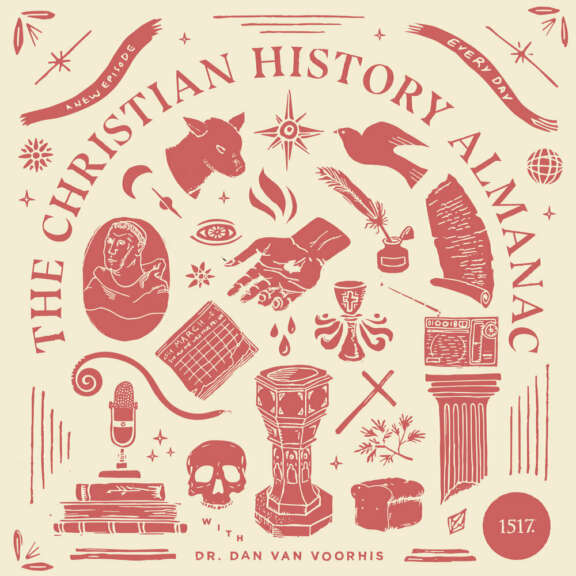On this day, we remember Eysteinn Asgrimsson, d. 1361, and the New English Bible NT publishing in 1961. The reading is "Neither Shadow of Turning" by Jack Clemo.
Podcasts
Each 1517 Podcast is dedicated to delivering Christ-centered content through weekly, monthly, and seasonal audio platforms. Listen online or on your favorite podcasting app.
Author
- All Authors
- Aaron Zimmerman
- Adam Francisco
- Amy Mantravadi
- Blake Flattley
- Bob Hiller
- Bradley Gray
- Brian W. Thomas
- Bror Erickson
- Bruce Hillman
- Caleb Keith
- Chad Bird
- Chris Rosebrough
- Christopher Gillespie
- Cindy Koch
- Craig Donofrio
- Dan van Voorhis
- Daniel Deen
- Daniel Emery Price
- Darrin Sheek
- David Andersen
- David Rufner
- David Zahl
- Debi Winrich
- Delwyn Campbell
- Donavon Riley
- Doug Klembara
- Edward Killian
- Elyse Fitzpatrick
- Erick Sorensen
- Flame
- Grant Klembara
- Gretchen Ronnevik
- Haroldo Camacho
- Jacob Smith
- Jared C. Wilson
- Jeff Mallinson
- Jeffrey Pulse
- Jessica Thompson
- Jim Nestingen
- Joel Fitzpatrick
- Joel Hess
- John Andrew Schreiner
- John Bombaro
- John T. Pless
- John W. Hoyum
- John Warwick Montgomery
- Katie Koplin
- Kelsi Klembara
- Ken Sundet Jones
- Magnus Persson
- Matt Popovits
- Michael Berg
- Michael Horton
- Nick Lannon
- Paul Koch
- Peter Nafzger
- Philip Bartelt
- Raleigh Sadler
- RJ Grunewald
- Robert Kolb
- Rod Rosenbladt
- Ron Hodel
- Sam Leanza Ortiz
- Sarah Condon
- Sarah Crowder
- Scott Davis
- Scott Keith
- Steven Paulson
- Tanner Olson
- Troy Neujahr
- Uwe Siemon-Netto
- Wade Johnston
- William Cwirla
-
On this day, we remember Lazarus Spengler, b. 1479, and Nicephorus, d. 829. The reading is "Love is And Was My Lord and King" by A.F. Tennyson.
-
On this day, we remember Gregory the Great, d. 604, and Paul Gerhardt, b. 1607. The reading is Gerhardt's "O Sacred Head Now Wounded."
-
That was really traumatizing! I quit! I'm out! Gillespie and Riley read and discuss Friedrich Nietzsche's "Antichrist." This episode, we talk about how Nietzsche’s critique of Christianity can help us check our presuppositions about what Christianity is and is not today.
-
On this day, we remember Ralph Abernathy, b. 1926, and James Reeb, d. 1965. The reading is "Prayer" by Christian Wiman.
-
On this day, we remember Dante's exile in 1302 and John Ogilvie, who died in 1615. The reading is an excerpt from Tim Keller's "The Reason for God."
-
Alright. That’s it. No more Old Testament proofs for you. Gillespie and Riley continue to read and discuss Erasmus’ diatribe on Salvation and Free Will. This episode, how to squeeze free will out of the Old Testament.
-
On this day, we remember the Forty Martyrs of Sebaste and Catherine of Bologna. The reading is "By the Cross of Jesus Standing" by Horatius Bonar.
-
On this day, we remember John Of God, b. 1495, and McCollum v. Board of Ed (1948). The reading is a poem from George MacDonald, "Forgiveness."
-
On this day, we remember St. Perpetua & Felicity who died in 203, and Alfred Edersheim, born 1825. The reading is "Remember Me, Implored the Thief" by Emily Dickinson.
-
On this day, we remember Michelangelo, born 1475, and Juan Luis Vives, born 1492. The reading is "On The Brink Of Death" by Michelangelo.
-
Yeah, well, you know, that’s just, like, your opinion, man! Gillespie and Riley continue to read and discuss Erasmus’ diatribe on Free Will and Salvation. How does Erasmus read the Bible and how does his interpretation continue to influence the church today? How does Erasmus’ anthropology determine how the church continues to preach and teach Christian doctrine?

